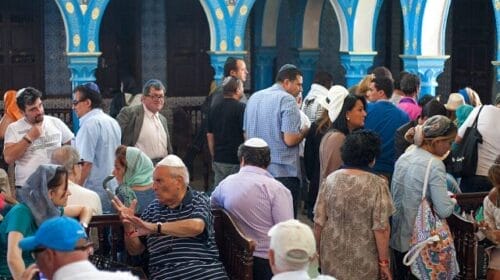The music group preserving an eroding ethnic tradition for Aka people

Unique drummed rhythms, dynamic dances, and instrumental music using harps, musical bows, and a flute.
It all testifies to the richness of an indigenous culture that today finds itself under threat.
Aka is an indigenous group predominantly based in the north of the Republic of Congo and Central African Republic.
Music is at the heart of its culture and has been used by the group to celebrate, but also protest.
Some songs are joyful, others are sad. Some sing of forest spirits and hunting, others about the many obstacles Aka people face today.
Some Aka people feel their culture and its traditions are being eroded over time.
This caught the attention of ethnologist Sorel Okanango Eta, who’s studied the group since 1996.
He decided to take action and raise awareness about the Aka people and preserve their culture and traditions. In 2003, Eta created the ‘Ndima’ music group, meaning “forest” in Aka language.
The group is made up of Aka dancers and singers.
Ndima is committed to the promotion and safeguarding of the Aka indigenous peoples’ cultural heritage through various shows and cultural events.
Throughout October, Ndima prepared for their next international tour, rehearsing dances and songs which draw attention to hardships faced by the Aka people, such as discrimination and sexual violence. The group is currently on tour in Europe.
Angélique Manongo is the oldest dancer in the group, she joined when it was first created in 2003.
“In the Ndima group, I sing, and I dance. In our songs, we talk about everything we experience in the forest. When we go on tour overseas and we teach white people how to sing and dance like us,” she says.
The Aka live in the forests of northern Congo-Brazzaville and speak the Aka language.
The group is striving to preserve its way of life despite the growing influence of modern cultures and the scarcity of resources in the sparsely populated forest, which has been devastated by farmers and loggers.
Aka music has formed a part of many Aka people’s daily lives since childhood.
“I learned to dance from a young age, I learned it from my mother. It is our mothers who transmit this knowledge to us, whether it is singing or dancing, and we follow in their footsteps,” says Manongo.
Some songs are joyful, others are sad.
Some sing of forest spirits, hunting, healing and mourning rites, others about the discrimination and violence Aka people face.
“First of all, there are cases of rape, we have songs in which they denounce the rapes. There are songs in which they denounce discrimination,” says the group’s founder and director Sorel Eta.
“Generally speaking, we sing for the hunt, for the spirits of the forest, we sing to denounce certain injustices,” he adds.
The group’s European tour is testament to its success and talent, but the group has also found support locally.
One fan of the Ndima group, Lemonde Bouele, has followed their music since childhood and often comes to watch them rehearse.
“I hung out with them in Ouesso, when I was eight-years-old. And through them, I got to know a music called Yodel. I had never heard of this before, I only knew it through them,” he says.
“Since I am used to coming to attend when they rehearse, or concerts like at the French cultural centre, I got a taste for it.”
The Aka are just one of at least ten ethnically and linguistically distinct groups in Central Africa.
They’ve been living in tropical forests for hundreds, if not thousands of years, according to some experts, who consider the group the “first citizens” of the Congo and Central African Republic.




